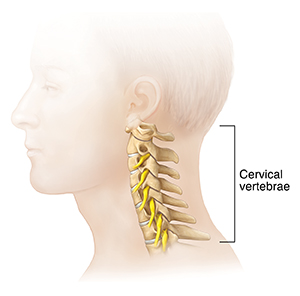Understanding Neck Fracture (Cervical Fracture)
A neck fracture is a break (fracture) in one or more bones in the neck. The neck contains the seven bones (vertebrae) that make up the cervical part of the spine. These bones support the head and help protect the spinal cord.
A neck fracture may be a minor hairline crack, or it may be a major break. The condition can be very serious if the nerves or the spinal cord are also damaged. In some cases, this can lead to paralysis or death. Any neck fracture is considered a medical emergency and requires medical care right away. Here’s a look at what to expect, from diagnosis to treatment and rehabilitation (rehab).

Diagnosing a neck fracture
In most cases, you will be taken to a hospital after a neck fracture has occurred. Your head and neck will be kept still (immobilized) in a neck collar to prevent any further injury. The health care provider will examine the affected area. They will ask how the injury occurred and ask about your symptoms. They’ll also do a full neurological exam to see if any parts of the nervous system (the brain, spinal cord, and related nerves) are affected.
You may also have one or more of these imaging tests to find out how severe the injury is and if the spinal cord is affected:
-
X-ray. This can show where the break is, and how severe it is.
-
CT scan. This can show other problems not seen on the X-ray.
-
MRI. This makes detailed images that can show if the spinal cord has been damaged.
Hospital stay
For a minor fracture, you may not need to stay in the hospital. You may be given a neck brace or collar to keep your neck in position and be able to recover at home.
For more severe cases, people may require a hospital stay to monitor their condition or to have surgery. Some people may need to be treated in the intensive care unit (ICU).
A neck fracture can lead to respiratory problems and trouble breathing. Some people may need to use a machine (ventilator) to help them breathe. In severe cases, there may be lasting (permanent) damage or paralysis, even after the neck heals.
Treatment for a neck fracture
Treatment for a neck fracture will depend on where the fracture is located, how severe it is, and if there is short-term or permanent spinal cord damage. Treatment will include pain medicine.
A minor neck fracture that doesn’t affect the spinal cord may be treated with a neck brace or collar for about 6 to 8 weeks until the bone heals. These devices help keep the neck in the correct position as it heals. You may have stiffness and pain in your neck. Or you may have muscle spasms in the nearby tissues that may be painful.
Severe or complex fractures often need traction, surgery, or 2 to 3 months in a rigid cast. Or there may be a combination of these treatments. A bone specialist (orthopedic surgeon) or a spine and nerve specialist (neurosurgeon) may be needed.
A severe neck fracture may also damage the spinal cord. Your neck bone may heal. But there may be permanent nerve damage to the spinal cord, and you may have some level of paralysis.
Care at home
After a minor neck fracture, you may be sent home from the hospital with a neck brace or a collar. It will take some time for your neck to heal. Follow any instructions your health care provider gives you. Here are some general tips to help care for yourself at home:
-
If you were given a neck brace or collar, wear it as directed. Don't remove it unless you're told to do so.
-
Follow any instructions your provider gives you for rest.
-
Don’t do any activities until your provider says it’s okay.
-
Take pain medicines as directed by your provider.
-
Try using heat or ice if this helps with any discomfort:
-
Use a heating pad for 15 to 20 minutes every 2 to 3 hours. Or take a warm shower for one of those sessions instead.
-
Use an ice pack for 10 to 15 minutes every 2 to 3 hours. To make an ice pack, put ice cubes in a plastic bag that seals at the top. Wrap the bag in a clean, thin towel or cloth. Don’t put ice or an ice pack directly on the skin.
-
Don’t drive until your provider says that it’s okay to do so.
Follow-up appointments
It’s important to go to all of your follow-up appointments with your health care provider.
When to get medical care
Contact your health care provider right away if:
Call 911 or get medical care right away if you get new weakness or numbness in your arms, hands, or legs.